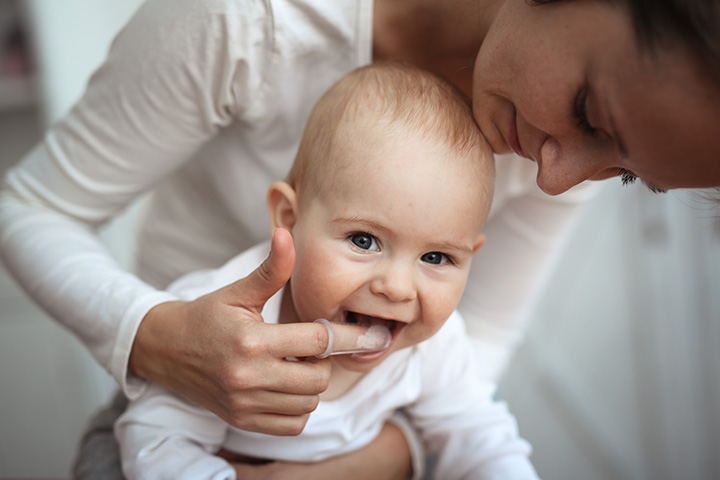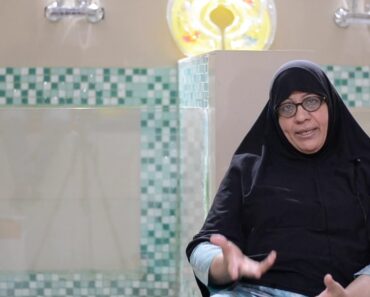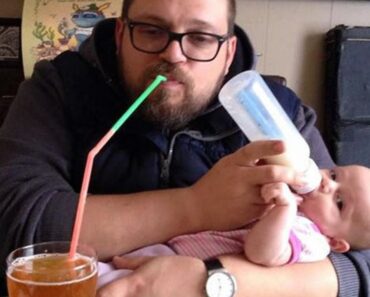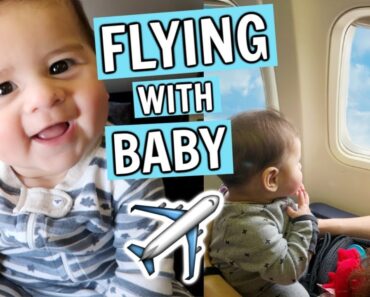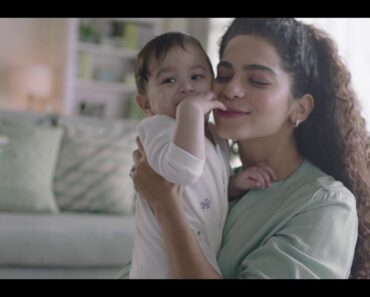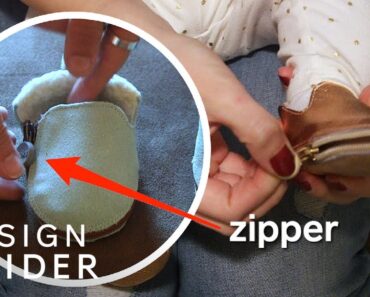image: Shutterstock
Maintaining good dental health is as important for babies as it is for adults. But most parents have many queries about brushing their baby’s teeth — the right time to brush, the best toothbrush to use, and whether they must use fluoridated toothpaste.
Setting the right brushing routine and practices goes a long way in keeping your child’s teeth disease-free throughout their life. Here’s all you need to know about brushing teeth for babies.
When Should You Start Brushing Your Baby’s Teeth?
The right time to begin brushing your baby’s teeth is when their first tooth appears around six months of age (1) (2). According to the CDC, around 80% of American children begin brushing their teeth later than they should. However, you would be surprised to know that you must clean your baby’s gums even before their first tooth erupts (3). Parents can use a soft, damp cloth to clean their baby’s gums after each feeding session for healthy oral health.
What Will You Need To Brush Your Baby’s Teeth?
Here is what you will need to clean your baby’s gums and brush their teeth.
1. Gauze pad or cloth
Parents must begin cleaning their baby’s mouth a few days after birth. You can use a clean, moist gauze pad or washcloth (4). Keeping their gums clean keeps their newly erupted teeth decay-free.
2. The right toothbrush
The right time to use a toothbrush for your baby’s teeth is when their teeth erupt between four and seven months but usually around six months of age. Around this time, it is convenient to use a finger toothbrush made of silicone as it gives the parents greater control over the brushing process (5).
As your baby grows older, you can select a kids’ toothbrush that has soft bristles and a smaller head (5). It is important to change your baby’s toothbrush once every three months, or sooner if their toothbrush bristles begin fraying as babies tend to chew on the bristles while brushing.
3. Toothpaste
Excess toothpaste is not recommended for children as it can lead to fluorosis (1). You must use a smear- or rice-sized quantity of toothpaste until the age of three. For children between three and six years of age, a pea-sized amount of fluoridated toothpaste is recommended by the American Dental Association (6).
Parents must continue to brush their child’s teeth up to six or seven years, or monitor the activity if the child wishes to brush on their own. When the baby’s teeth begin to touch each other, it is recommended to initiate flossing (6).
How To Brush Baby Teeth?
Below are the steps to follow to brush your little one’s teeth (2).
- Place your baby in your lap with their head supported by your chest.
- For babies younger than three, use a smear of toothpaste on their baby brush or a finger brush.
- Begin brushing your baby’s teeth in circles, taking time to cover all the surfaces of each tooth.
- Be gentle while brushing your baby’s teeth as their gums are soft and delicate.
- Do not forget to clean their tongue. Use the bristles of the toothbrush to clean their tongue.
- Take a damp washcloth and wipe away any visible toothpaste froth. Older babies and toddlers could be encouraged to spit out. There is no need to rinse the mouth with water.
You must make it a habit to brush your baby’s teeth twice a day and for about two minutes each time.
What To Do If Your Baby Hates Brushing Teeth?
Some babies take to brushing easily, while others may dislike it. Here are some ways to get your baby on board with brushing.
1. Introduce gradually: Take small steps and introduce brushing to your baby gently. You may start with a mock brushing session where you place the baby in your lap. Use a wet gauze pad or finger brush to pretend that you are brushing the baby’s teeth. Repeat it each day at a fixed time. It will make it easier for the baby to adapt to the actual process eventually.
2. Make it enjoyable: There are multiple ways to make brushing enjoyable for the baby. Make funny brushing noises, put on some fun brushing videos, or get their favorite TV character or cartoon character-based toothbrushes to make it a fun experience.
3. Sing a song: Singing a song is a fun way to get your baby to brush and distract them while you brush their teeth.
4. Let them copy you: Children love to copy others, especially their parents. Make brushing a family affair where you brush your teeth and allow them to watch you. This could make them more compliant during the brushing process.
5. Use two toothbrushes: Babies and toddlers love to do everything by themselves. Give them a toothbrush to keep them occupied while you brush their teeth with the other.
6. Try without toothpaste: Many babies dislike the taste of toothpaste. If you observe that your baby doesn’t like toothpaste, get them used to brushing initially and then introduce small amounts of toothpaste as they grow older (7).
Frequently Asked Questions
1. What if the baby’s teeth bleed while brushing?
If you observe your baby’s gums bleed while brushing, it may be a sign of gum disease (8). It is best to visit your baby’s pediatric dentist to get their teeth and gums evaluated.
2. Should you brush the baby’s teeth after every feed?
It is advised that you clean your baby’s gums with a clean and moist gauze pad or washcloth after every feed. Once your baby’s teeth appear, you can brush them twice a day.
3. Can you brush your baby’s teeth with coconut oil?
It is recommended to use only fluoridated baby toothpaste to brush a baby’s teeth. There is no scientific evidence to prove that using oil has any beneficial effect on dental hygiene (9).
Oral care for babies begins even before their first milk teeth appear. Parents can use a clean gauze pad or washcloth to clean their baby’s gums after every feed. They can use a baby toothbrush once their teeth begin to appear. It is important to brush your baby’s teeth at least twice a day and remember to clean their gums and tongue, too.
References:
2. Looking After Your Baby’s Teeth,NHS UK
3. Brushing your child’s teeth,Department of Health Government of Western Australia
4. Baby Teeth,Mouth Healthy by American Dental Association
5. Brushing Baby Teeth: Handy Hints and How-Tos,NCT New Parent Support
6. Dental Care Tips for Mom and Baby,American Dental Association
7. Toothbrushing- Children,Better Health Channel
8. Periodontal Disease in Children,University of Rochester Medical Center
9. Oil Pulling, American Dental Association
